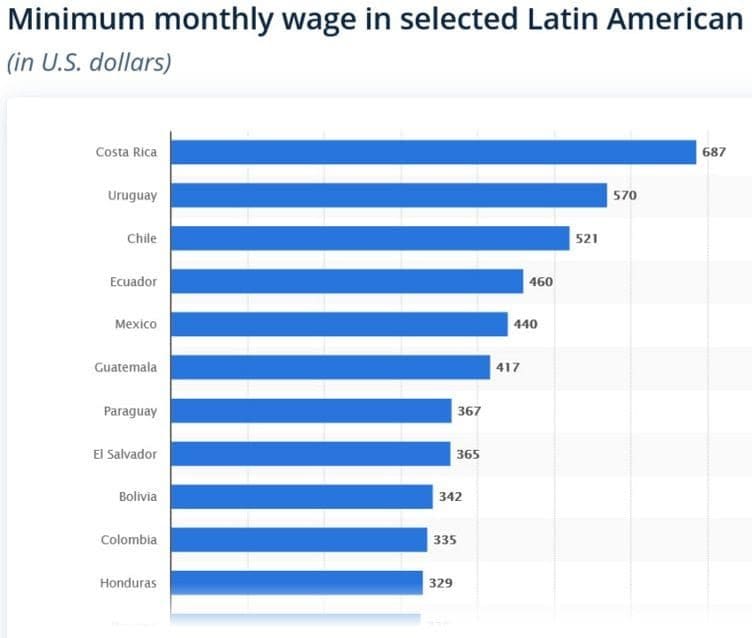
Latin America’s minimum wage divide: Costa Rica Highest
QCOSTARICA — Costa Rica has the highest minimum wage in Latin America, around US$680 monthly, according to a study by Statista, an increase of 1.83 % compared to the previous year and over US$100 dollars more than the second place, Uruguay.
Following closely Costa Rica’s leading position in the minimum wage is Uruguay at over 22,268 Uruguayan pesos (around US$556 per month), and Chile at 500,000 Chilean pesos (approximately US$532 per month)
Other countries in the region show varied minimum wage levels, such as Colombia’s minimum wage of 1,300,000 Colombian pesos, roughly US$323 per month and Argentina, where the minimum wage is set at 234,315 Argentine pesos, equating to about US$163 per month.
On the other side of the spectrum is Venezuela, where employees are only guaranteed by law a minimum salary of 130 bolívares or US$3.60 per month.
This disparity highlights significant economic challenges and opportunities within the region.

It is important to note that these numbers are calculated using nominal values and do not consider variations in purchasing power or cost of living among these economies
List of Minimum Wages in Costa Rica by occupation for 2024
This makes direct comparisons potentially misleading and may not accurately reflect the economic landscape of different countries in Latin America.
The wide range in minimum wages across Latin America reflects the diverse economic conditions and policies within the region.
Countries like Costa Rica, Uruguay, and Chile demonstrate that higher minimum wages are achievable and beneficial for worker security and economic stability.
However, countries like Venezuela highlight the severe consequences of economic mismanagement and structural issues.
The minimum wage variations across Latin America reveal much about the economic health and policies of each country. While Costa Rica sets a high standard with its robust minimum wage, Venezuela’s situation serves as a stark reminder of the challenges that persist.
As the region continues to evolve, understanding and addressing these disparities will be key to fostering economic resilience and equitable growth.
Can Latin Americans survive on a minimum wage?
Even if most countries in Latin America have instated laws to guarantee citizens a basic income, these minimum standards are often not enough to meet household needs. For instance, it was estimated that almost 25 million people in Mexico lacked basic housing services. Salary levels also vary greatly among Latin American economies. In 2020, the average net monthly salary in Mexico was barely higher than Chile’s minimum wage in 2021.
What can a minimum wage afford in Latin America?
Latin American real wages have generally risen in the past decade. However, consumers in this region still struggle to afford non-basic goods, such as tech products. Recent estimates reveal that to buy an iPhone, Brazilian residents would have to work at least two months to be able to pay for it. A gaming console, on the other hand, could easily cost a Latin American worker several minimum wages.
